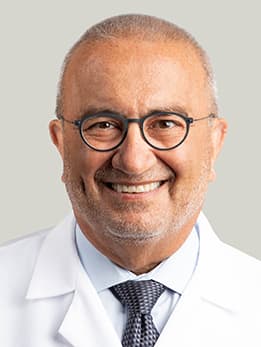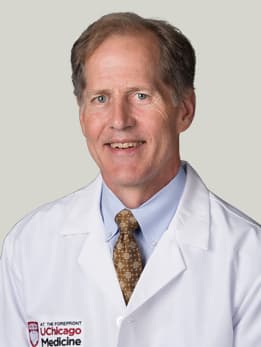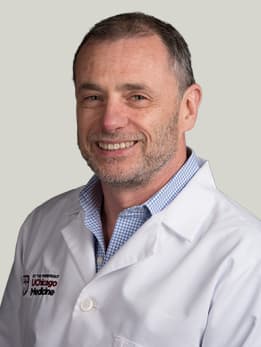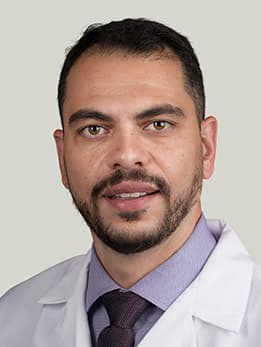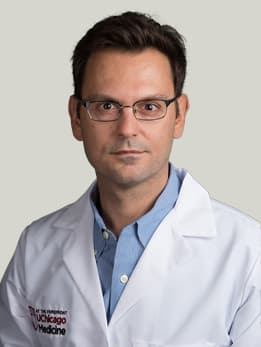UChicago Medicine Telestroke Network
UChicago Medicine Telestroke Network
When someone has a stroke, every minute counts. A prompt diagnosis and treatment plan can mean the difference between recovery and lifelong disability. The University of Chicago Medicine Telestroke Network enables onsite and remote stroke experts to work collaboratively in real time to diagnose and treat stroke patients as quickly as possible to reduce stroke-related disabilities.
The telestroke network uses a high-tech communications platform and a high-resolution video system that allows a board-certified neurologist from the Comprehensive Stroke Center at UChicago Medicine to evaluate patients, review CT scans and help the affiliate emergency department physicians determine an appropriate care plan rapidly and effectively. This ensures patients will have access to UChicago Medicine neurologists and neurosurgeons experienced in the diagnosis and management of stroke even if the hospital does not have these specialists on site.
How Telestroke Works
Using a high-resolution video system, the neurologist can speak face-to-face with patients and their families, and even evaluate the patient’s pupils. In addition, the neurologist will have instant access to the patient’s medical information, including CT scans, vital signs and lab results. Together, the stroke neurologist and clinical team can determine a care plan - whether it be at the local hospital or transferred to the Comprehensive Stroke Center in Hyde Park.
The UChicago Medicine Comprehensive Stroke Center in Hyde Park is a Telestroke Hub for three area hospitals, including Ingalls Memorial Hospital, Methodist Hospital and Silver Cross Hospital.
[MUSIC PLAYING] Stroke is the leading cause of adult disability and the fifth leading cause of death in the United States. When someone is having a stroke, time is of the essence. For every hour's delay of medical treatment, the brain will lose 120 million cells. Therefore, patients and their loved ones must seek treatment as quickly as possible in order to preserve the functionality and quality of life.
You said your symptoms started about 15 minutes ago?
Across the Chicagoland area, it's imperative that patients have access to the leading expert in acute stroke treatment, medical management, and posthospitalization rehabilitation, no matter where they are.
Hello.
Hi, Dr. Kass. We have Mrs. Williams here. She presented today. She's been here about 20 minutes now. Prior to arrival 15 minutes, she had right-sided weakness she noticed while she was eating.
OK. Raise your arms up like this. And keep them up.
Through our telestroke program, UChicago stroke experts are available 24/7 hours a day, 7 days a week to provide immediate and convenient access to the highest-quality stroke care via telemedicine.
OK, ma'am. Don't worry. It looks like you're having a significant stroke. And we will take care of you. This requires a high level of care to be managed emergency. But we also will start the thrombolysis, which is a clot-busting medication that will help resolve the stroke. And we will activate the UCAN team to quickly transport the patient to UChicago's Hyde Park campus to undergo additional special procedures.
Here at UChicago, we are proud to provide our patients with state of the art technology, clinical care, and medical devices. We participate in numerous clinical trials, which allow our patients to access new technologies and therapeutics before they are widely available. Our expert physicians and researchers are advancing the science not only to implement stroke treatment remotely but also to provide remote surgical services, including operating catheters and other interventions from afar, to treat patients immediately.
The University of Chicago Medicine Aeromedical Network, or UCAN, provides rapid helicopter transport of critically ill or injured neonatal, pediatric, and adult patients. UCAN is staffed by a dedicated team of specially trained flight nurses, EMS pilots, and communication specialists all of whom are ready to respond 24/7 hours a day, 7 days a week.
Our multidisciplinary team consists of neurologists, neurointensive care specialists, neurosurgeons, advanced practice providers, therapists, and other experts who are always on hand to provide comprehensive care for people who have had a stroke. Our neurointerventional team specializes in minimally invasive techniques for the diagnosis and treatment of conditions of the brain, head and neck, spine, and spinal cord. After procedure, our incredible neurointensive care unit cares for our patients.
When a complex severe neurological illness or injury afflicts a patient and their family, the University of Chicago neurocritical care team offers accurate diagnosis, effective treatment, and caring support to return patients to good health. We work very closely as a cohesive team from the moment the patient arrives throughout their stay in the neuro ICU.
At the forefront of medicine here in the heart of Chicago, we are proud to operate the busiest stroke service in the area. With our telestroke service, we are able to extend our expertise well beyond the borders of Hyde Park and ensure stroke patients all over the region receive the best possible care. At the University of Chicago, the future of stroke care is already here. With our telemedicine services expanding all over the region, we're excited to expand access to our world-class stroke care.
[MUSIC PLAYING]
Stroke Center
The University of Chicago Medicine is a Joint Commission Certified Comprehensive Stroke Center, nationally recognized for its expertise in providing the highest level of care for stroke patients.
Learn more about our stroke and neurovascular services
